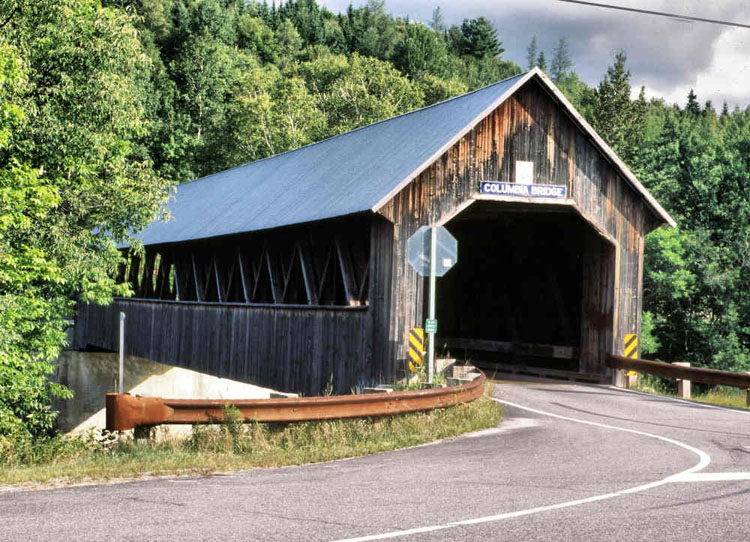
The Columbia Covered Bridge
Lemington, VT
WGN Number: 45-05-02

Photo by Joe Nelson © 1997
The single-lane, single-span Columbia Bridge connects Columbia, New Hampshire, with Lemington, Vermont, where the mighty Connecticut River is still a small stream. This highway bridge uses the Howe truss, which is usually found in railroad bridges.
The Covered Spans of Yesteryear website provides some additional historic information: "The Columbia Bridge is the fourth bridge at this location. The first was built around 1820. It was swept away by the ice freshet of 1840. The ferry service resumed until the next bridge was built in 1844 by the Columbia Union Toll-Bridge Company. Apparently that bridge was blown down and replaced by a single-span covered bridge built by the Columbia Toll-Bridge Company in 1892. The 1892 span burned in 1911 when the toll house was set on fire by sparks from a passing locomotive. The current bridge across the Connecticut River (NHDOT #077/140) is a covered wood-and-steel Howe truss built by Charles Babbitt (some sources state Charles and his brother). It was rehabilitated by the state in 1981 at a cost of $143,000. It is the most northerly Connecticut River bridge connecting Vermont and New Hampshire."
Columbia Covered Bridge Vital Statistics
| Town: | Lemington |
| Location: | Route 102 |
| Crossing: | Connecticut River |
| Date: | 1912 |
| Builder: | Charles Babbitt |
| Truss Type: | Howe |
| Truss Length: | 146 feet |
| National Register of Historical Places Listing Date: | December 12, 1976 |
| Date Rehabilitated: | 1981 |
| Rehabilitation Contractor: | Unknown |
Credits: All pictures, information and descriptions are taken from Spanning Time Vermont's Covered Bridges by Joseph C. Nelson ©1997 and the World Guide to Covered Bridges - 2009 unless otherwise specified.
